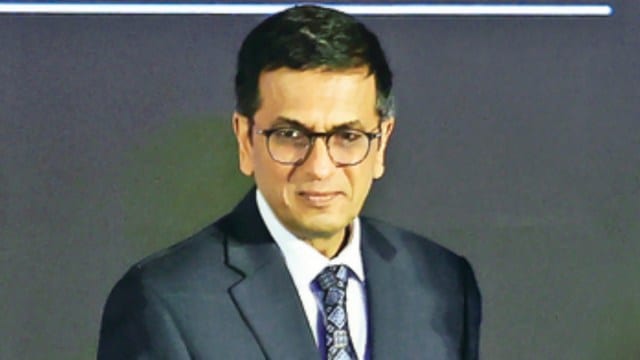Constitution relevant because it serves changing needs: CJI Chandrachud
This was visible in the 2022 Dobbs v. Jackson Women's Health Organisation, wherein the US Supreme Court “employed an originalist approach in concluding that the right to abortion is not explicitly mentioned in the Constitution and, therefore, not protected”.
 Chief Justice of India DY Chandrachud
Chief Justice of India DY Chandrachud Chief Justice of India D Y Chandrachud said Thursday that the Constitution continues to be relevant because it is sensitive to the changing needs of its constituents.
Delivering the M K Nambyar Memorial Lecture here, the CJI said, “Understanding of the Constitution as a living document aids constitutional courts in understanding new, novel problems. It also facilitates the Court in finding a jurisprudential basis for solutions to existing social problems.”
The CJI said that unlike India which follows the doctrine of a living constitution, the US goes by originalism which at its core, posits that the Constitution’s meaning is fixed and should be interpreted based on its original understanding at the time of its adoption, giving primacy to the purported intent of the framers.
This was visible in the 2022 Dobbs v. Jackson Women’s Health Organisation, wherein the US Supreme Court “employed an originalist approach in concluding that the right to abortion is not explicitly mentioned in the Constitution and, therefore, not protected”.
CJI Chandrachud said, “In this way, a rigid obsequence to the text of the Constitution and the purported intention of the framers, although tempting, can often result in a restrictive reading of citizens’ rights.”
The CJI said, “No two generations are reading the Constitution in the same social, legal or economic context. No generation, including the present, can have a monopoly over solutions or confidence in its ability to foresee the future. As society evolves, so must the constitutional doctrine. The institutions which the Constitution has created must adapt flexibly to meet the challenges in a rapidly growing knowledge economy”.
He said that “besides subjectivity, the problem with an unreasoned tethering with the framer’s intent is that it renders the Constitution susceptible to inflexibility. The Constitution was never meant to be a set of iron-clad rules governing social and legal relations. It was meant to be a broader framework of principles which would constitute the bedrock of our new political reality. Paradoxically, fixation with the original intent of the framers is contrary to their own vision”.
He said that “a conservative reading of the framers’ intent belies their foresight’ and it was never their intention to lock the provisions of our Constitution in place, for eternity.”







